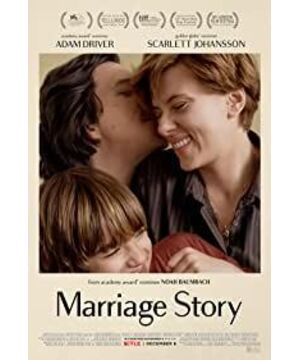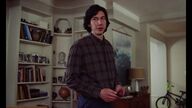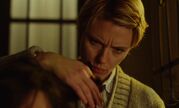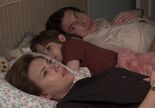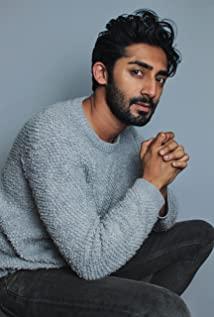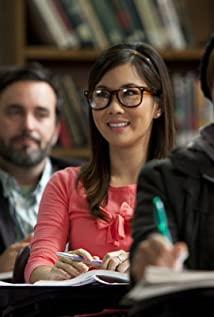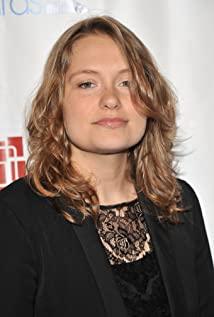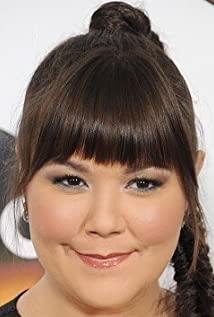14 years ago, Noah Baumbach created "The Squid and Whale" based on his parents' divorce experience when he was young. The comedy elements of youth growth and the self-deprecating intellectuals make this divorce story sad but harmless after all. Ironically and bitterly, the teenager who stood in front of the squid and the whale and thought he understood the rules of adult love, became a party to the divorce story 14 years later, and reinterpreted marriage, love and other things with a "Marriage Story". Devil.
Removing the warm barriers of family and parenthood, "Marriage Story" is able to focus on the two protagonists themselves who have experienced divorce, and use more precise and cruel brush strokes to trace the end of an intimate relationship. In the process, there were tears and quarrels, attacks and duties, conflicts were laid out and escalated, and hourly lawyers dissected a marriage like a corpse. The children caught in it were used as props, and mistakes and grievances were infinitely magnified. , And the once true beauty was ruthlessly denied and torn.
But this is not the whole story of "Marriage Story." In this process, there are also the flashes of warmth of the past, the calmness of the dust settled, and standing at the end of love looking back at the starting point, looking back at the occurrence, evolution and development of the whole love, re-examination of the self and the past Treasure and let go of a close lover. It is such a mature and warm, emotional and human background that makes "Marriage Story" a modern marriage fairy tale that truly belongs to adults.
"Marriage Story" is not just a divorce story.
space
Charlie, who hates Los Angeles, always hears people say, "Los Angeles has a lot of space."
Space is the third invisible protagonist in "Marriage Story". In this divorce story that turns around in different cities, one of the narrative functions of space is reflected in the relationship between space and characters . The relationship between Nicole and Charlie and their respective spaces is the external manifestation of their long-standing identities, and the space they are in, and the self reflected in the space, has become more symbolic as the divorce progresses. Changes.
The dispute between Los Angeles and New York for residence is the most obvious first contradiction between Nicole and Charlie. The difference between the two cities and the two spaces is the concrete manifestation of the huge difference between the personalities, growth experience and even the core of the husband and wife.
Nicole, who was born in a family of Hollywood performing arts, is a person who truly belongs to Los Angeles: passionate, outgoing, caring for others, and enjoying family. She has a close relationship with her mother and sister who live in Los Angeles, and she can easily travel to and from the pool party and the studio. Such her, in the cramped Brooklyn apartment in crowded New York, would "feel very small", and returning to Los Angeles, the obsession to fight for the right to freely choose living space has also become one of the reasons for Nicole's determination to divorce. .
Contrary to Nicole, Charlie's soul belongs to New York. He has a bad relationship with his parents, and he was independent early, and living in a cold metropolis made him feel at ease. He despised the noise of Hollywood and dedicated his body and mind to the theater. The place he was accustomed to was a dark and private tavern, where he only needed to socialize with the closest crew members.
As the divorce progressed, Nicole got his wish and returned to the big open house in Los Angeles, but Charlie was forced to enter the empty space he was not used to, into the large and cold hotel room in Los Angeles, the empty California apartment, and the deserted Brooke whose sofa was moved. Lin Apartment finally compromised and tried to live in Los Angeles. While Nicole was reshaping himself, Charlie had to completely shatter his relationship with space, as well as the original life and identity established in this space.
Another function of space is to depict the real emotions and attitudes of the two protagonists to each other through the distance between the two protagonists when they are in the same space . Close-ups and reverse shots are deceptive. Only by taking a step back and seeing the full picture of the space can you truly appreciate the emotional flow between the two characters. On the subway in the middle of the night, Nicole and Charlie were silent from a distance; in the fierce confrontation of the court, Nicole and Charlie sat at the two ends of the long table, bowed their heads and listened to the attack of the other's lawyer, with each other's figures in the background. Blurred; while in Charlie's empty apartment room, maintaining hypocritical politeness, the two greeting each other are actually placed at the opposite ends of the screen, and the remaining decentness is about to be torn apart.
But estrangement is not the only form of distance between two people. In this flowing story, there is no lack of close intimacy and tenderness between Nicole and Charlie. Nicole cut Charlie's hair, squatted down and laced his shoes, bringing the two people closer together again and again. Even when the final part of the final separation is written, there is a meaningful dissolve, and the two people who are already in different cities are put back together again.
It is the repetition of distance and emotion, the jumping between intimacy and indifference, warmth and alienation, which gives the "Marriage Story" a true but sober texture.
that power
In a conversation with a divorce lawyer, Nicole said: "I feel very small."
On the one hand, this smallness is spatial. Living in crowded New York compresses Nicole's freedom and happiness, but it is more psychological. The identity of Charlie as the director and Nicole as the actress framed the relationship between guidance and guidance, watching and being watched in the family and creation , and this level of power relationship directly led to the unfair distribution of creative power and voice between the two .
The identities of Nicole and Charlie are quite interesting. Nicole was once a star that broke out of fame in youth comedy, and Charlie was the director of the Pioneer Theater. Under this kind of discourse system of “arts are high and low”, Nicole inevitably feels inferior. After she gave up her own choice of works and gave the power of guidance to Charlie, who is more artistic and avant-garde, Nicole’s voice inevitably becomes worse. The coming weaker and weaker, and Charlie is inevitably more and more accustomed to being in a high position of power. Even at the stall where the two are about to divorce, he can't help but comment on Nicole's acting skills in the last performance.
What's interesting is that Nicole's farewell performance on the theater stage plays Electra, who represents the Electra complex. In Bergman's "Mask", the actress Elizabeth played by Liv Uman also lost her voice on stage when she played Electra, and never said a word.
After Nicole broke free from her husband's creative shackles, she was the first to take the divorce to law, realizing the reversal of power in the relationship between the two. The passage where Nicole's sister handed over the divorce documents to Charlie may be the funniest part of the film, involving a nickname, a northern British accent, and an inexplicable faction. With the delivery of this document, Nicole also handed the film's narrative perspective to Charlie without a trace.
The interesting thing about the two-line narrative structure of "Marriage Story" is that the perspective always focuses on the side with low power. When Charlie took over the POV, what he faced was running around, tossing and turning, the exhaustion of passiveness, the inability to fight away, and eventually losing the belonging and identity of the family and the sense of existence. During the two years of Halloween, he changed from an invisible man to an invisible man. The ghost in the sheets.
In Charlie's perspective, there is a short rehearsal scene between Nicole and the lawyer. At this time, it is no longer just Nicole alone who is in a low position, but all the women who have been given higher demands in their family and marriage life and are kidnapped and defined by the labels of "good mother" and "good wife". With the help of the female lawyer played by Laura Dern, “Heavenly Father doesn’t even have fxck”, it can be elected this year’s best feminist speech, allowing the audience to re-evaluate the roles and roles of Charlie and Nicole in this relationship. status.
The director tried his best to be fair in dealing with the two characters, but he could still see his partiality towards Charlie as the husband in the divorce. This kind of eccentricity is first reflected in the screen time. The whole episode of the investigator's visit feels that it was added specifically for Charlie, in order to portray his loneliness and powerlessness more delicately and profoundly. But Baumbach seems to have deliberately avoided the impropriety of Charlie's derailment, focusing on using Nicole's alienation and divorce's influence on Charlie to defend him and win his sympathy.
However, the heartbreak and fragility that Charlie experienced in this divorce seemed insignificant compared to the neglect, suppression, and betrayal that Nicole experienced in her previous marriage. On the one hand, the equal rights speech from a female perspective is commendable, but on the other hand, Baumbach still seems unable to jump out of his inherent perspective, revealing a trace of his conceit and self-pity as a male in the character of Charlie.
"story"
"Marriage Story" is a story about a story.
Their respective lawyers emphasized the importance of narrative to them early . The story is the most persuasive weapon, Nicole and Charlie divorce if you want to win this battle, you have to rearrange the memory, to judge fictional an unhappy marriage, the other is a jerk and that he is a victim of the story, even if They all know that this is not the case.
In this context, "Marriage Story" is no longer a simple divorce story. It uses a sophisticated dual perspective to expose a cruel fact to the audience: this is the life story written by Nicole and Charlie, and this is theirs. Keep telling yourself, and finally choose a story that you unconditionally believe, which has nothing to do with the other party from beginning to end.
In that wonderful and bursting quarrel scene, Charlie finally broke out, relentlessly refuting and overturning the story that Nicole kept telling him . In the story told by Nicole, she is Charlie’s accessory. She was trapped in a corner of Brooklyn by Charlie and deprived of the opportunity to speak and create. But in Charlie’s story, Charlie became Nicole to escape Los Angeles and try Tools for a new life.
This is the most important reason why Nicole and Charlie are destined to separate. Nicole feels that he is a label, Charlie feels that he is being used, everyone is tied to the narrative he created, and the best time for communication has long been missed.
Perhaps there is no real communication between humans, and two independent individuals can never truly understand each other, because humans are the animals of the story , and each person is the protagonist in his own story, which is reasonable and not objective.
Robbie Ryan, who took the shot of "The Beloved" last year, once again used his excellent sense of space in "Marriage Story" to restore the emotional flow and distance in the love relationship. The quarrel between Nicole and Charlie is particularly obvious. Robbie knows when to capture the most emotional close-ups of the two characters, and when to immediately zoom out and place them at the opposite ends of the screen ruthlessly.
Randy Newman, who once scored the "Toy Story" series and "Monsters Electric Company", added a fairy tale-like sentiment to "Marriage Story", and the two in the story are as comfortable and comfortable as knowing that they are characters in the movie. Feel free to express emotions with the help of the soundtrack. Although this kind of soundtrack and stage-like lighting treatment is a bit "push for emotion", like deliberately scratching the audience's emotions, it does not prevent us from following the tears of the characters every time.
Perhaps the biggest highlight of "Marriage Story" is the performance of Scarlett Johansson and Adam Driver. The film has a lot of monologues and a lot of long shots, but the two actors are perfectly finished with extremely natural and real emotions. No performance is sensational or deliberate. The tear in Nicole's left eye, Charlie's twitching and choking when reading a letter, are so similar to us when we experienced heartbreak.
Scarlett contributed two very different but attractive mother images in the two hottest awards seasons "Marriage Story" and "Jojo Rabbit" this year. This year is destined to belong to her. Charlie's solo at the end surprised many people. In fact, everyone may have forgotten that Dreyfu also starred in "Drunk Country Folk Songs" and directed a drama in "City Girl". The talented "driver" will have another one afterwards. The more serious "Torture Report", and the ugly Kailoren with his mask off at the time, has steadily embarked on the path of acting with his excellent selection of films and more refined acting skills.
In the end, are Charlie and Nicole still in love? I think the answer is yes. Nicole would still inadvertently call Charlie "Dear" when arguing, and would be delighted from the heart that Charlie won the prize, and Charlie, after having to find a hairdresser by himself, would definitely remember the last time Nicole cut his hair. Gentleness. Nicole expressed his love for Charlie in the letter that Charlie finally read, and Charlie, finally returned to the tavern in his comfort zone, sang a song about his lover.
But does the answer to this question really matter?
From this perspective, "Marriage Story" is not a guide for marriage dismissal. It is not aimed at the ugliness and embarrassment in married life. On the contrary, it affirms the tragic influence of individual narratives in marriage and intimacy, but also affirms the possibility of individuals to grow and reshape themselves outside of marriages that are no longer suitable. .
But this does not mean that "Marriage Story" is neither sad nor regrettable. After making the right decision that a sane adult should make, the separated Nicole and Charlie will definitely meet a close lover who can ruin their sleep, but can this newcomer be like the one who left? They feel alive rather than alone, no one can guarantee.
Back from "us" to "me", alone is alone, not alive.
View more about Marriage Story reviews


